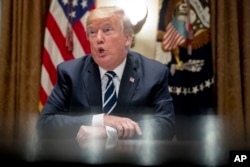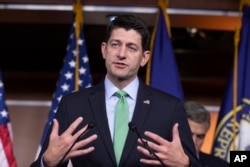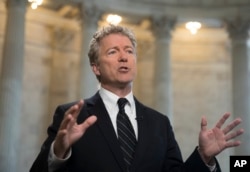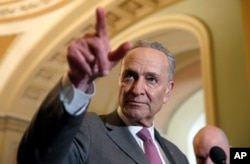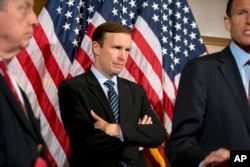President Donald Trump reversed himself Tuesday, saying he accepted the U.S. intelligence community's conclusion that Russia meddled in the 2016 presidential election, a day after siding with Russian President Vladimir Putin's denial that Moscow had interfered.
"I accept our intelligence community's conclusion that Russia's meddling in the 2016 election took place. Could be other people also. A lot of people out there," Trump told reporters in remarks from the White House.
His previous acceptance of Putin's denial that Moscow was involved in election interference drew sharp criticism from both Republican and Democratic U.S. lawmakers for taking the foreign leader's word over his own country's intelligence agencies. Lawmakers called his comments shameful and a disgrace to the U.S. presidency.
Wrong word, he says
At a White House meeting with Republican lawmakers on Tuesday, Trump said that after he reviewed a transcript of his Helsinki remarks, he realized he had misspoken.
"In a key sentence in my remarks, I said the word 'would' instead of 'wouldn't.' The sentence should have been ... 'I don't see any reason why it WOULDN'T be Russia,' " Trump said.
But he added that the Russian actions had no impact on his victory over Democrat Hillary Clinton, a former U.S. secretary of state, and reiterated his frequent statement denying that there was any collusion between his campaign and Russian operatives.
Remarks by President Trump:
He said his administration would do everything it could to thwart any Russian efforts to interfere with November's U.S. congressional elections.
"We will stop it, we will repel it," Trump vowed.
Before backtracking, Trump said on Twitter that he had a great summit with Putin and gave no ground about accepting Putin's denial of interference in the U.S. election two years ago.
On Capitol Hill, House Speaker Paul Ryan, a Wisconsin Republican, responded to Trump's rosy assessment.
"Let's be very clear: Russia meddled in our election," Ryan said. "We know they interfered with our elections, and we have passed sanctions on Russia to hold them accountable."
When asked about election meddling during a joint news conference with Putin on Monday, Trump said, "President Putin was extremely strong and powerful in his denial today."
Congressional criticism
A day later, U.S. lawmakers continued to condemn Trump's performance.
"It's almost as if Donald Trump is embracing Putin's knees. I'm ashamed of it. Every American should be," Senate Minority Leader Charles Schumer, a New York Democrat, said. "Can you imagine if President [John F.] Kennedy believed [Soviet Premier Nikita] Khrushchev when he said there were no missiles in Cuba?"
Some Republicans have come to Trump's defense. Senator Rand Paul of Kentucky said, "The president has gone through a year and a half of totally partisan investigations — what's he supposed to think?"
Democrats are demanding action to rein in Trump and counter Russia, from congressional hearings on the Helsinki summit to increased sanctions against Russia to legislation protecting the special counsel in the Russia investigation, Robert Mueller. Mueller's 14-month investigation is ongoing, with no apparent end in sight.
"Words are not enough. Our response to the debasement of American interests before a foreign adversary demands a response not just in word but in deed," Schumer said. "Our Republican colleagues cannot just go 'tsk, tsk, tsk.' They must act."
"I think there's a lot we can do together," the Senate's No. 2 Republican, John Cornyn of Texas, responded. "But as long as this becomes a political, partisan, stop-Trump-at-all-costs effort, I don't think we are going to make much progress."
Meanwhile, the chairman of the Senate Foreign Relations Committee, Tennessee Republican Bob Corker, told reporters he expected Secretary of State Mike Pompeo to testify on Russia as early as next week.
Some Trump critics called on his key national security aides to quit in the face of the president's statement that he had "confidence" in both Putin and the U.S. intelligence community.
Senator Chris Murphy, a Connecticut Democrat, asked in a Twitter comment, "If you're on the Trump national security team, and you've been out there saying how strong Trump is on Russia and how serious our commitment is to NATO, how do you not resign after the last four days?"
There has been no indication so far that any of Trump's key aides plans to quit.





